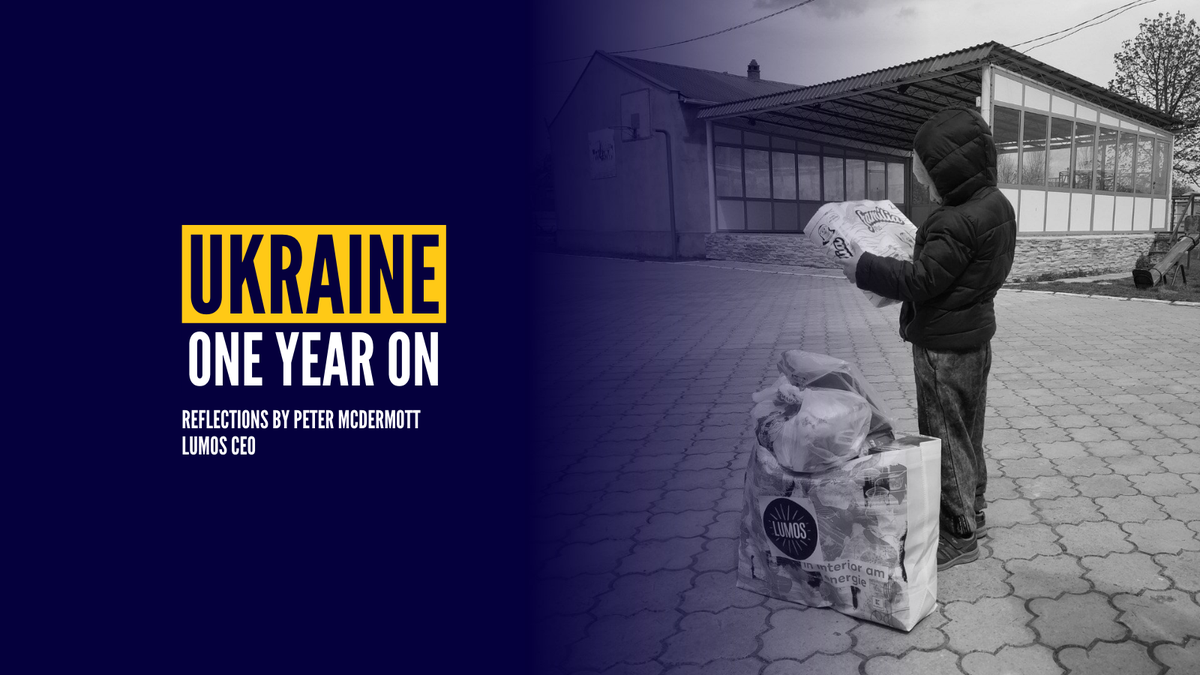It’s hard to believe that it’s been a year since the war in Ukraine began. Time has seemed to both stand still, and to drive forwards relentlessly.
When I joined Lumos as CEO in June 2021, we’d been working in Ukraine since 2013, supporting the transformation of the care system so that children can live at home with their families, rather than in orphanages. While our operations in the Eastern regions were hindered by the armed conflict beginning in 2014, in the Zhytomyr region we saw the number of children in institutions decrease by 48%. Unfortunately, our plans to build on this work were brought to an abrupt halt when, on 24th February 2022, Russia attacked Ukraine.
For Lumos, this sombre anniversary is a moment to reflect on the last 12 months, and to adapt our work to further our mission to fight for every child’s right to a family – even in the most difficult of circumstances.
KEY ACHIEVEMENTS
Although Lumos is not a humanitarian agency, we immediately pivoted to where the need was greatest. Quite simply, children needed food, medical and hygiene items. Thanks to the incredible support of donors, and a hugely successful public fundraising appeal, in 2022 Lumos delivered:
- Humanitarian aid to 13,925 vulnerable children
- Educational kits to 7,450 children
- Educational equipment to 28 Inclusive Resource Centres
- 30 tonnes of fuel for the transportation of children with disabilities, foster families and internally displaced families.
Instantly, it became clear that the trauma experienced by these already incredibly vulnerable children would be on an unimaginable scale. Mental health support was a top priority, and in 2022 we delivered trauma training to practitioners all across the country. Through this training, 25,900 psycho-social support sessions have been delivered to children and their carers across Ukraine.
WORKING TOGETHER
The partnerships we’ve been fortunate to form over the last 12 months have enabled us to act quickly. As well as working with central and local governments, we’ve connected to numerous national and international networks and partnered with local NGOS such as Manifest Mira. Our recent alliance with Terre des Hommes Netherlands will develop our work with refugee children and families who’ve fled to Moldova. Through multiple collaborative projects, we’re prioritising strengthening Civil Society in 2023.
Our increasing presence on the ground in Ukraine is empowering our advocacy work. In June we expanded our work to Odessa, and we’re pleased to now have a Country Manager based in Kyiv, as well as a staff member in the office of the Ombudswoman for Children. We have been key participants in a number of high-level meetings and in July organised a UK Parliamentary event. We’re hoping to lead roundtables in 2023 with key national and international actors. It is crucial that, as we look towards the rebuilding of Ukraine, children are top of the agenda.
It is always easier to reflect on successes than on challenges, but 2022 has been a sharp learning curve. I am continually in awe of the resilience, bravery and sheer dedication of our colleagues in Ukraine and Moldova. Working through the coldest winter months, sometimes without electricity or heating, under the constant threat of bombardment, are conditions that fortunately many of us can’t imagine. On several occasions we’ve had to halt our operations because it simply wasn’t safe. But through it all, our colleagues’ determination to be there for the children that need us goes above and beyond.
IMAGINING UKRAINE’S FUTURE
The Ukraine Recovery Conference in the UK this June is a key moment. We now need to think about the families returning to Ukraine – with so much infrastructure destroyed, how do we ensure they can access vital services like inclusive education and healthcare? We know that lack of access to such services is one of the major reasons why, before the war, over 100,000 of Ukraine’s children were in institutions – though only a staggering 8% of these were orphans. At the beginning of the war, around 43,000 children were rapidly returned home without proper assessment or support. Worryingly, one year on we’re seeing the numbers of children in institutions rising again – again in no small part due to a lack of resources and access to vital services.
It is critical for Ukraine’s future that community services are properly funded and strengthened so that children aren’t trapped in institutions but can thrive at home with their families. In her recent speech at the World Economic Forum, First Lady of Ukraine Olena Zelenska said: “We must completely get rid of classical orphanages […] giving all children the opportunity to grow up in families.” This raises a crucial question – what does the future of a Ukraine without these institutions look like? And how can we make it happen?
Child protection interventions save lives, and the war has severely eroded Ukraine’s child protection system. Strengthening it will require cross-sectoral co-operation, which is why collaboration is central to our plans for the year ahead. In 2023 our main goal is to support the holistic transformation of child welfare and protection systems so that all children can grow up in a family, with access to education, health and protection services.
We will also continue to deliver aid, particularly targeted at children at risk of entering the residential care system, such as:
- Children rapidly evacuated from institutions
- Children with disabilities
- Children who have been displaced.
The institutional care system in Ukraine did not appear overnight, and despite the destruction that war brings, it cannot be dismantled overnight either. But this is nevertheless an opportunity for us all to reimagine a Ukraine where children are not trapped in orphanages, but where families and communities have the resources and services they need to take care of children where they belong – at home.



